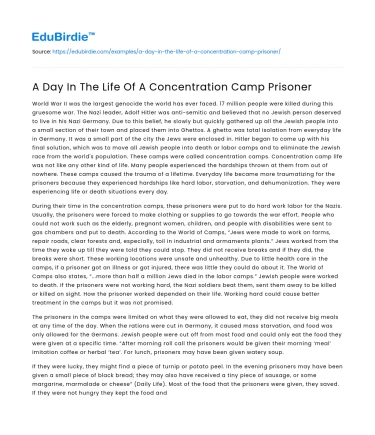World War II was the largest genocide the world has ever faced. 17 million people were killed during this gruesome war. The Nazi leader, Adolf Hitler was anti-semitic and believed that no Jewish person deserved to live in his Nazi Germany. Due to this belief, he slowly but quickly gathered up all the Jewish people into a small section of their town and placed them into Ghettos. A ghetto was total isolation from everyday life in Germany. It was a small part of the city the Jews were enclosed in. Hitler began to come up with his final solution, which was to move all Jewish people into death or labor camps and to eliminate the Jewish race from the world's population. These camps were called concentration camps. Concentration camp life was not like any other kind of life. Many people experienced the hardships thrown at them from out of nowhere. These camps caused the trauma of a lifetime. Everyday life became more traumatizing for the prisoners because they experienced hardships like hard labor, starvation, and dehumanization. They were experiencing life or death situations every day.
During their time in the concentration camps, these prisoners were put to do hard work labor for the Nazis. Usually, the prisoners were forced to make clothing or supplies to go towards the war effort. People who could not work such as the elderly, pregnant women, children, and people with disabilities were sent to gas chambers and put to death. According to the World of Camps, “Jews were made to work on farms, repair roads, clear forests and, especially, toil in industrial and armaments plants.” Jews worked from the time they woke up till they were told they could stop. They did not receive breaks and if they did, the breaks were short. These working locations were unsafe and unhealthy. Due to little health care in the camps, if a prisoner got an illness or got injured, there was little they could do about it. The World of Camps also states, “...more than half a million Jews died in the labor camps.” Jewish people were worked to death. If the prisoners were not working hard, the Nazi soldiers beat them, sent them away to be killed or killed on sight. How the prisoner worked depended on their life. Working hard could cause better treatment in the camps but it was not promised.
Save your time!
We can take care of your essay
- Proper editing and formatting
- Free revision, title page, and bibliography
- Flexible prices and money-back guarantee
The prisoners in the camps were limited on what they were allowed to eat, they did not receive big meals at any time of the day. When the rations were cut in Germany, it caused mass starvation, and food was only allowed for the Germans. Jewish people were cut off from most food and could only eat the food they were given at a specific time. “After morning roll call the prisoners would be given their morning ‘meal’ imitation coffee or herbal ‘tea’. For lunch, prisoners may have been given watery soup.
If they were lucky, they might find a piece of turnip or potato peel. In the evening prisoners may have been given a small piece of black bread; they may also have received a tiny piece of sausage, or some margarine, marmalade or cheese” (Daily Life). Most of the food that the prisoners were given, they saved. If they were not hungry they kept the food and saved it for the next day when they knew they would be hungry. Some of the food was also given to the prisoners to last them until the next morning, such as the bread they were given at dinner. With all the starving people it turned the camps into a place filled with disease-filled starving skeletons. The Nazis did not provide the prisoners with the proper amount of food to carry out their hard work. When becoming too weak due to starvation they could not continue to work and then were sent to gas chambers to be killed. With so many people wanting to survive in the camps, there was always a fight for food; “Kity Hart-Moxon, a survivor of Auschwitz-Birkenau, remembers the high value placed on food, and so much wanting to survive the camp. She would sometimes take the piece of bread from the body of someone who had died during the night” (Daily Life). Prisoners would take food from a person who has died just to get more for themselves. This genocide was depended on the survival of the fittest and who would make it out alive.
Jewish people in the camps also experienced many factors of dehumanization. Before they even entered the camps they experienced it daily. The camps were made to serve as a detention center for people who Nazi leaders deemed to be supervised danger to the German race.






 Stuck on your essay?
Stuck on your essay?

